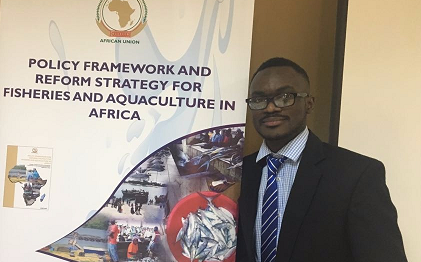
Richard Nyiawung
May 15, 2018
Rashida Mohammed Uthman
August 14, 2018With an interdisciplinary background in environmental studies and political science, Dr. Garrett Richards is broadly interested in knowledge mobilization for sustainability. He wants to understand how to take existing knowledge in universities and “move” it to where it can do the most good for society and the environment. How do we ensure produced knowledge about the environment will be useful and relevant? How might contemporary debates about energy and sustainability be better informed by expert knowledge? How (and where) can the policy-making process draw on academic research in order to arrive at more socially and ecologically sound decisions? In practice, this research examines cases of public deliberation as well as partnerships between academia, government, and community, usually around issues of energy or climate change. Garrett is a board member for the Environmental Studies Association of Canada, is passionate about public speaking and debating, and is a certified facilitator for the internationally-recognized Instructional Skills Workshop.
PhD, Environmental Studies and Political Science, University of Victoria (2016), Dissertation: Climate Change Action through Co-Productive Design in Science-Policy Partnerships at Municipal, Provincial, and National Levels of Government
MES, Environment and Sustainability, University of Saskatchewan (2010), Thesis: Complexity as a Cause of Environmental Inaction: Case Studies of Large-Scale Wind Energy Development in Saskatchewan
BA, Political Studies, University of Saskatchewan (2008)
BSc, Environmental Studies and Biology, University of Saskatchewan (2007)
Theoretical and Conceptual Areas: knowledge mobilization, science-policy interfaces, deliberative democracy, evidence-based policy, interdisciplinarity, transdisciplinarity
Empirical Areas: climate change, renewable energy
Methodological Areas: interviews, focus groups, document reviews, policy evaluations, surveys, systematic reviews
Principal Investigator – Mapping Expert Roles through the Academic, Public, and Policy Realms: A Case Comparison of Energy Policy Debates in Newfoundland and Labrador (not yet funded, initial stages)
Principal Investigator – Synthesizing Knowledge about Knowledge Mobilization: An Interdisciplinary Review (unfunded, initial stages)
Principal Investigator – Beyond Interdisciplinarity: Building Co-Productive Research Dialogues for Climate Change (funded, analysis stage)
ENVP 6002: Research Design and Methods
None yet. Garrett is a new professor (start date: August 1, 2018).
Richards, G. (2018). “The Science-Policy Relationship Hierarchy (SPRHi) Model of Co-Production: How Climate Science Organizations Have Influenced the Policy Process in Canadian Case Studies.” Policy Sciences (In Press, Available Online).
Richards, G. and R. Carruthers Den Hoed (2017). “Seven Strategies of Climate Change Science Communication for Policy Change: Combining Academic Theory with Practical Evidence from Science-Policy Partnerships in Canada.” Chapter in Handbook of Climate Change Communication (eds. Filho, W., U. Azeiteiro, E. Manolas, and A. Azul).
Richards, G. (2017). “How Research-Policy Partnerships Can Benefit Government: A Win-Win for Evidence-Based Policy Making.” Canadian Public Policy, vol. 43(2), pp. 165-170 (and Policy Options, September 14). -Lacroix, K. and G.
Richards. (2015). “An Alternative Policy Evaluation of the British Columbia Carbon Tax: Broadening the Application of Elinor Ostrom’s Design Principles for Managing Common-Pool Resources.” Ecology and Society, vol. 20(2), art. 38.
Richards, G., K. Belcher, and B. Noble. (2013). “Informational Barriers to Effective Policy-Public Communication: A Case Study of Wind Energy Planning in Saskatchewan, Canada.” Canadian Public Policy, vol. 39, pp. 431-450.
Richards, G., B. Noble, and K. Belcher. (2012). “Barriers to Renewable Energy Development: A Case Study of Large-Scale Wind Energy in Saskatchewan, Canada.” Energy Policy, vol. 42, pp. 691-698.


